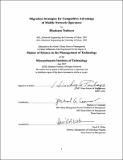Migration strategies for competitive advantage of mobile network operators
Author(s)
Tsuboya, Hisakazu, 1967-
DownloadFull printable version (2.824Mb)
Other Contributors
Massachusetts Institute of Technology. Management of Technology Program.
Advisor
Michael A. Cusumano.
Terms of use
Metadata
Show full item recordAbstract
Innovation in platform industries, including mobile telecommunications, has a great impact on societies and economies; hence a migration from an existing platform to the subsequent one should be progressed under careful forecasting, weighed scenarios and strategies that encompass a broad view. This thesis analyzes why mobile network operators are struggling to move from the second generation (2G) and its derivatives to the third generation (3G) technologies and proposes migration strategies, which allow them to sustain their competitive advantage. First, a migration model is proposed as a reinforcing loop model composed of two dynamics, "Platform Migration" caused by a shortage of network capacity, and "Service Innovation" triggered by a decline in ARPU (Average Revenue Per User). Platform migration is an implementation process for new platform technologies and can be categorized into Revolution-type and Evolution-type. After these two schemes have been evaluated through case studies, Collaboration-type migration, an enhanced Evolution-type, is proposed for future, technically diversified situations. Service Innovation is a process for creating new profitable services to give further revenue growth. Empirical analysis clarifies that mental breakthrough management is a common approach in the mobile industry and proposes that a mixture of corporate, partner and market initiatives be adopted for diversified customer preference. This thesis then proposes the following strategies for future successful migration: first, mobile network operators should drive the migration cycle powerfully, concentrating on successive service innovation dynamics for their revenue growth and the next platform migration. Second, they should choose migration schemes carefully according to their level of technology leadership, value chain leadership and investment capability. Finally, service platform should be considered for realization of innovative services with Partnership Dynamics.
Description
Thesis (S.M.M.O.T.)--Massachusetts Institute of Technology, Sloan School of Management, Management of Technology Program, 2003. Includes bibliographical references (leaves 145-149). This electronic version was submitted by the student author. The certified thesis is available in the Institute Archives and Special Collections.
Date issued
2003Department
Management of Technology Program.; Sloan School of ManagementPublisher
Massachusetts Institute of Technology
Keywords
Management of Technology Program.